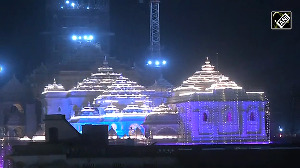No one. This brief answer sums up India's efforts to counter terrorism which has been growing in both size and dimension over the years.
This brings us to the next question: Who should have been in charge of the operations? The answer is: The National Security Advisor.
For almost three days, a handful of terrorists (we are still not sure how many) held Mumbai, and the country, to ransom while more than a 1,000-strong (could be more) remained engaged in counter measures which were, at best, partially successful.
Emotions have no place in such a situation. It is all very well to commend the commandos; they certainly did a wonderful job and deserve kudos. They could have done better. The country expects no less; there are no second opportunities in such circumstances. It is not the first time that we are dealing with acts of terror; perhaps the scale and audacity of the attacks are vastly different. By now we should have had a clearly laid down procedure to deal with such a crisis situation.
The fact that there was no one person who knew what was going on in Mumbai showed no sign of such a procedure. For two days, no one moved to take charge, neither in Mumbai nor in Delhi.
In Delhi, there was no sign of any Crisis Management Group meeting either; and in the meeting which the prime minister called, he kept out, at least that was what the media reported, the Union home minister and the National Security Advisor. So it is any body's guess who briefed the meeting about the development, threats, intelligence warnings and what should be done next.
In Mumbai, there were too heads who were running the show. The local police chief was on the job; so was the director general of police, besides the political leaders, including the chief minister
Since there was no one in charge, there was chaos on the ground; no one reigned in the media, no one thought of securing the area, keep the media and the public away from the scene, coordinate with medical teams and figure out how to keep the casualties low. No command and control centre was set up, even thought of. No control rooms were established in Mumbai or Delhi.
There were neither any First Response Teams or Quick Reaction Teams. The First responder, the Mumbai police's Anti-Terrorism Squad, were neither equipped nor aware of the immensity of the situation they were getting into, and therefore lost some of the best officers.
While there are well-thought out post-crisis management plans for earthquakes, droughts and locust invasion, there is none to handle a terrorist incident of the magnitude which Mumbai has witnessed. There is a body called the National Crisis Management Committee headed by the Cabinet Secretary with the Secretaries of Home, Defence and other ministries as members. This committee, at least in times of natural crises, entrusted with the task of coordinating rescue, relief and rehabilitation measures.
This committee also oversees the Crisis Management Group which is supposed to be summoned in times of terrorist attacks or hijackings. The last terrorism-related crisis which saw the CMG meeting was the 1999 Kandahar hijacking. The CMG faced flak over the delay in deciding how to handle the hijacked plane which had landed in Amritsar for refueling. There is no news of any such meeting being convened during the two-day long terrorist crisis which India faced.
Wilson John is Senior Fellow, Observer Research Foundation






 © 2025
© 2025